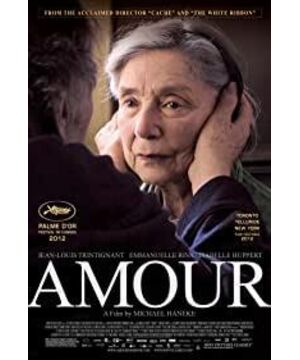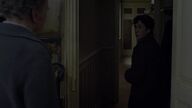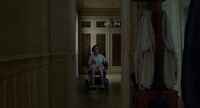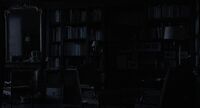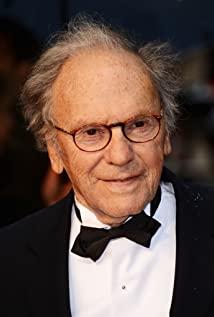In the middle of the film, Anne's condition gradually deteriorated, and George was on the verge of carrying a weight on her body, and he was almost unable to take care of her. But she has to choose to seek death. All these mixed up and attacked the elderly, his peaceful pace of life has been disrupted, these are all reflected in the subconscious dream. In the dark night, he heard someone ring the doorbell, opened the door and went out to the public corridor of the apartment. The water under his feet rushed. When he was at a loss, he stretched out a hand behind his back and covered his mouth. From this angle, it can be seen that those hands are extremely old, just like the hands of Annie we see in front of the screen. This dream is a bit scary, which is a psychological portrayal of George at this time. He was disturbed by the confusion of life and the death request made by his wife. In the face of death, human beings have an innate awe and fear.
And the second scene of separation from reality appeared in George's hallucinations. At this time, his wife's condition further deteriorated. She was paralyzed all over, with incontinence and signs of dying. George can no longer afford to take care of her, so he can only hire a caregiver. Annie's diaper change overturned by the caregiver like a child is undoubtedly painful for a music professor who used to sway her talent on the art stage. After such a scene, what appeared was Annie sitting next to the piano and playing gracefully. The tune was soothing and graceful. Although the player was old but still glamorous, she switched to George sitting quietly in the room and looking directly at her. The appearance of-the scene just now was George's subjective point of view, such an elegant Anne and the old man in the hospital bed are in a world of difference. Suddenly George turned off the CD player behind him, the music stopped, and the audience suddenly realized that everything was George's imagination. It is his inability to do anything about the past memories and reality when he listens to his wife’s work. In the face of the serious force majeure of death, human power is really weak, and he can only make a weak sigh about the difficulty of returning to the good times. This is also true. A surreal expectation.
George held Annie's hand and quietly told her the story of his childhood. Childhood is probably the best memory of a person's life. Freud gave a lot of explanations, so I won't repeat them here. Anne calmed down in his story and went to sleep. At this time, George picked up the pillow and sent his wife to another world. This scene is the focus of all the power in the film. He has always been calm about this. The story reached its climax at this point. Time is a willful and easily compromised carver. When there is no disease intrusion, it will carve a beautiful and magnificent appearance. Even when it gets old, it can still be charming and long, but when the disease comes, it will Immediately he became abominable and became an accomplice of illness, depriving people of the most basic ability to act, and ultimately handing humans into the hands of death without leaving a trace of dignity. After seeing through all of this, Annie chose to break away from the demon plan of time and disease early, and finally gave her life to her lover to make a choice, and died in the hands of the person who held her hands for the rest of her life. The utmost respect for those who maintain their dignity. George brought some flowers from outside, cut the white chrysanthemums and put them in the water. The chrysanthemums are part of the western funeral tradition, and in China they have the aloof meaning of "the gentleman among the flowers". From this point, Annie puts the Chinese and Western The culture's sustenance of flowers is perfectly combined. It is conceivable that Anne is lying quietly on the white sheets. In the house where she and her husband have lived for many years, there are only the two of them. There is no need for redundant and formal funerals. Only the husband stays by her side. Chrysanthemums were sprinkled next to his body to complete a sincere and pure ceremony. Life ends here, making people who live in the mediocre world yearn for it.
And the clip showing George's death after paying homage to his wife is really an ingenious pen. George bought back things from outside, cut the flowers, packed the closet, and sealed all the doors of the house with tape, in order to convey to the audience that he will leave with his wife. In the performance of such a seemingly simple passage, the director chose a surreal expression technique. At this time, George heard Anne's call to get up from the bed. There was a rushing sound of water over there. It was Anne who was washing the dishes. Then she got dressed and went out the door and said to George, "Why don't you wear clothes?" During this process, George looked at his wife without saying a word, then put on his clothes and went out with her. This scene is the most common segment in their lives. Putting it at this node in the movie gives this segment a special meaning: the film is almost an indoor movie, from the beginning to the end of the movie, except for the beginning of the movie. Two or three scenes from the Champs Elysées and one scene on the two-person bus, the rest all took place in the apartment. For the two elderly people, all the plots after the wife’s illness were in the apartment. This is where they live. It is their residence in this existing world. In the end, Annie and George put on clothes and left here. The story ends the moment they close the door. The intention is to tell the audience that the two of them finally left this room together, leaving the real world they had existed for decades, they closed the door and walked towards another world together. Recalling the nightmare scene from this perspective, George walked out of the house. Is it really Annie that covered him? Maybe it is the caller of another world. Just using one of the most common life scenes, placing a scene in a special position in the movie makes the story glow with different meanings. The director let us see the magical effect of montage permutation and combination.
Regarding the pigeons that appear twice in the film, Haneke has repeatedly claimed that they have no special meaning, but he still has to express more about them. The pigeon is a tool used to transmit signals, and it is also a symbol of freedom. George made the same choice when he met the pigeons and released them. The difference is that the second time he released the pigeons, he wrote the plot to Already in the letter of the wife in heaven. Like a pigeon, George gave her freedom and dignity. Regarding freedom, the five paintings cut out in the second half also vaguely conveyed this signal: when Annie was in dying condition, after the careless care of her daughter and son-in-law, her body was deteriorating to the point that she refused to eat, George Helplessly slapped his wife, and instead appeared five landscape paintings. These five paintings are not only a buffer for the tension of the scene just now, but also show the vast jungle, earth and sky one by one, which are related to freedom.
The whole story of the movie is about the two grand and profound philosophical propositions of love and death. They seem to appear very often in our lives, but they are the kind that make people unable to end life and seem ugly. In fact, Haneke combines these two factors into one story, and at the same time puts forward the ethical paradox of "painful living and happy death". Movies, like people, have their own timeliness. No matter how rich a person experiences, they can't escape the limitation of the time stage. A director who is over seventy years old and two actors who are almost elders, they present their works together. Different people have different feelings, even the same person has different opinions at different time periods. From this point of view, the long artistic life of the film is gratifying.
View more about Amour reviews


